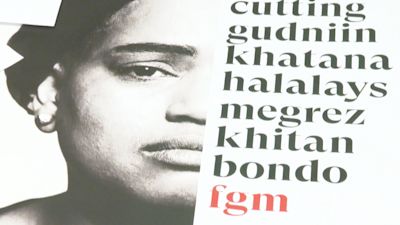‘They’re killing us’: West Yorkshire FGM survivors speak out

Report by ITV News journalist Annie Knowlson
Survivors of female genital mutilation (FGM) in West Yorkshire have spoken out about the pain and suffering they have endured in a bid to encourage other women to get help.
The practice affects thousands of women and girls in our region – many of East and West African heritage – despite having been illegal in the UK for decades.
Now the Leeds Clinical Commissioning Group is urging them to access services at a specialist clinic – known as the Blossom Clinic – and has started a campaign to publicise the help available.
Hawa Bah, who grew up in Guinea, was around eight years old when she was "cut". Because of cultural tradition, the process was welcomed.
She said: "One of my important organs, taken for no medical reason. It’s really upsetting because it’s gone, I can’t have it, it’s gone. They took something from me that’s very important to me.
"Back home you see loads of girls are praying to be cut because if you are cut and your friend is not cut you're not allowed to play together any more. It’s like discrimination, you are low level – 'I am bigger because I’ve been cut'."
At the age of 17, Hawa fled her home – and a forced marriage – in West Africa and moved to Leeds. This was when she started to understand more about what had happened to her.
"Since I understood that it’s something that's wrong, that it’s child abuse, then I started to talk about it. It was so scary to talk about it because they brainwash us back home saying 'if you disclose this secret to anyone you will die'."
Hawa now works as an advocate for the Blossom Clinic, which opened in Leeds in 2018 to help women affected by the physical and mental scars of FGM.
Staff support people across the whole of the north and have recently opened a new clinic in Bradford, but say they want to see specialist services introduced more widely.
Andrea Taylor, a specialist FGM midwife, said: "We offer them any advice around their FGM, any questions they may have, we provide counseling for the women that need it and we also offer any medical procedures that they might need.
"They come from all over the UK to see us. We could do with more specialist clinics around the country to support these women and offer what we offer."
While services were affected by the pandemic, the numbers of women being helped by the team is increasing year on year.
'They are killing us'
'Aisha' – not her real name – was referred to the clinic before she became pregnant. Now she is having a baby and complications due to FGM mean surgical intervention may be needed for a safe birth.
"The support is overwhelming. I’m having a girl, now I’m thinking is she going to go through the same thing I’ve been through as well? People are doing it for culture but they are killing us."
As part of the campaign leaflets are being put into community centers and libraries across West Yorkshire in several languages and across social media. Educational packs will be given to teachers who may be working with students affected by FGM.
Hawa and Aisha are urging everyone to stand up in the fight again FGM so one day these practices will be left in the past.
Hawa said: "We need to push and bang the doors, it’s everyone’s business wherever you come from, it’s everyone’s business. We stand together, we speak out, we raise our voices, we spread the word."
What is FGM?
FGM, or female genital mutilation, is a practice prevalent across the globe in some communities, but mainly in West and East Africa, where external female genitalia is removed or damaged for non-medical reasons. It has been illegal in the UK since 1985.
There are four different types of FGM ranging from the removal of the clitoris (Type 1) to creating a seal to narrow the vaginal opening (Type 3). All other harmful procedures to the genitals are classed as Type 4.
FGM support
Blossom Clinic email: leedsth-tr.blossomclinic.fgm@nhs.net
Forward (Foundation for Women’s Health Research and Development)
Want a quick and expert briefing on the biggest news stories? Listen to our latest podcasts to find out What You Need To Know.